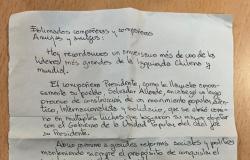The president of the UCR presented his minority office with substantial modifications to the national government’s priority project.
There is no simple session since December 11. The record debates in Deputies express this situation, which was replicated in the uncertainty that Pink House until the last of the plenary session of commissions in the Senatewhere Guillermo Francos had to appear at Congress and keep -along with Victoria Villarruel– face-to-face meetings with those who are undecided to achieve the clearance of majority of the law Bases. Now, Martín Lousteau added one more addition to the parliamentary tension.
The content you want to access is exclusive to subscribers.
to subscribe I am already subscribed
The radical senator presented this Friday his minority opinion for the session next Wednesday at 10 in the Upper House. Lousteau is not assured of the treatment of his project, given that the wording agreed upon by the ruling party has voting priority as it is the majority. However, in the same session the senators could reverse their support for the Government’s text and decide to approve the initiative of the president of the UCR. No matter how you vote, Deputies will define the future of a Bases law that will return very different from how it left that room.
The scene of Freedom Advances for the session is still promising, although the approval of the Bases law is not unobjectionable. Villarruel He called a parliamentary work meeting for Monday at 6 p.m., where he will be again with the block bosses and may confirm agreements. However the majority opinion obtained by Casa Rosada has a strong composition of dissenting signatures: They will support the project in general terms but will reject some articles in the vote by vote.
It seeks to twist those wills Martin Lousteau, that could have the unanimous support of Union for the Homeland (33 senators, 4 from the majority) and observes the positions of his coreligionists Maximiliano Abad (which rejected the Government project) and Pablo Blanco (who signed the ruling despite a fiery opposition speech).
Despite the meeting tour of Guillermo Francos with provincial governorsthere is still a group of inorganic senators whose votes are still a mystery: the Santacruceños Edith Terenzi and José María Carambiathe entrerriano Edgardo Kueider or the chubutense Andrea Cristina.
Ezequiel Atauche Senator of the Argentine Nation Law Bases Senate Budget and Finance Commission
Abdala and Atauche, the libertarian senators in charge of the plenary commissions, together with Kueider, one of the most fractious dialogueists.
Ignacio Petunchi
Bases Law in the Senate: main differences between Lousteau’s project and the original
The minority opinion presented this Friday by the senator Martín Lousteau (UCR – CABA) includes a series of reforms to the Bases law and the fiscal package that the senators requested when signing the majority office in dissent.
Base Law:
- exceptional powers: The list of emergencies that were given exceptional powers to President Javier Milei is eliminated.
- State agencies: incorporates organizations (Treasury Attorney General’s Office, SIGEN, Genetic Data Bank) to the list of state institutions that cannot disappear. The term of administrative delegations to the Executive is limited to one year, which cannot suppress powers or functions of the included entities.
- Trust Funds: The Executive cannot replace the purpose of existing trust funds.
- Privatizations: Correo Argentino, Aerolíneas Argentinas and public media are excluded from public companies susceptible to privatization.
- Procedures before the State: The free administrative processes carried out by companies are eliminated and allow the support of public organizations.
- Public hearings: Public hearings are held for reasons of social interest.
- Public employees: Express consent must be requested from public employees to require their availability, when it comes to a work trip greater than 70 kilometers.
- Large Investment Incentive Regime: All articles are eliminated, with the exception of what is pertinent to attracting investments for the development of LNG and mining activity.
- Educational funding: includes an article -unpublished until now in the project- that declares education as an essential service and stipulates the bimonthly update of the educational budget.
- Labour reform: replaces the title of the labor reform with the initiative that radicalism presented this year.
Tax package:
- Money laundering: It prevents those who have entered into any money laundering scheme in the last ten years from entering again. Those with criminal records for money laundering or people who are not residents of the country are excluded. The funds that come in must be co-shareable. It prohibits the brothers of officials and contractor or supplier companies from laundering.
- Social monotax: The social monotax regime is maintained.
- Income Tax: They propose an increase in the floor established by the Government. They modify the scale update every three months, instead of every six.
- COUNTRY TAX: establishes a 30% co-participation for the provinces.






